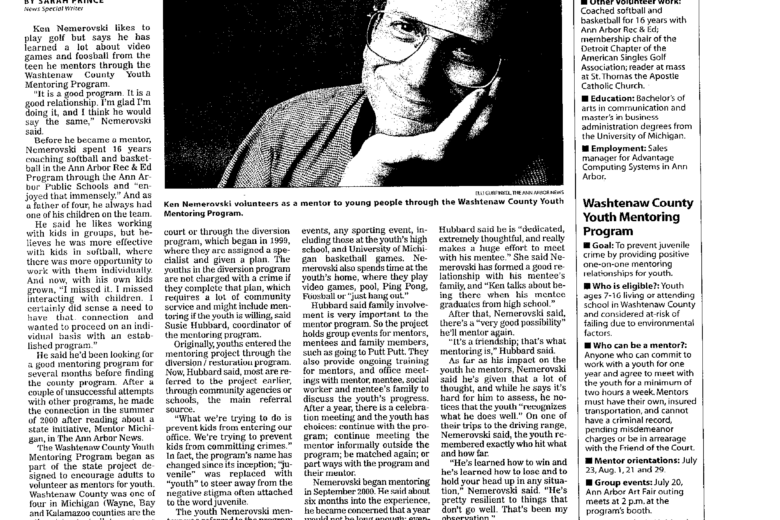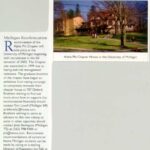Former Coach Finds New Mentoring Role
by Sarah Prince, The Ann Arbor News, Saturday July 6, 2002
Guidance program helps steer youths away from crime while they learn to succeed in school and other activities
Ken Nemerovski likes to play golf but says he has learned a lot about video games and foosball from the teen he mentors through the Washtenaw County Youth Mentoring Program.
“It is a good program. It is a good relationship. I’m glad I’m doing it, and I think he would say the same,” Nemerovski said.
Before he became a mentor, Nemerovski spent 16 years coaching softball and basketball in the Ann Arbor Rec & Ed Program through the Ann Arbor Public Schools and “enjoyed that immensely.” And as a father of four, he always had one of his children on the team.
He said he likes working with kids in groups, but believes he was more effective with kids in softball, where there was more opportunity to work with the1n individually. And now, with his own kids grown, “I missed it. I missed interacting with children. I certainly did sense a need to have that connection and wanted to proceed on an individual basis with an established program.”
He said he’d been looking for a good mentoring program for several months before finding the county program. After a couple of unsuccessful attempts with other programs, he made the connection in the summer of 2000 after reading about a state initiative, Mentor Michigan, in The Ann Arbor News.
The Washtenaw County Youth Mentoring Program began as part of the state project designed to encourage adults to volunteer as mentors for youth. Washtenaw County was one of four in Michigan (Wayne, Bay and Kalamazoo counties are the others) to start pilot programs in 2000.
Washtenaw County’s program is now under the guidance of the prosecuting attorney’s offices on Packard Road in Ann Arbor, as part of the Juvenile Diversion I Restoration Program. All juveniles who commit a crime in the county are sent to court or through the diversion program, which began in 1999, where they are assigned a specialist and given a plan. The youths in the diversion program are not charged with a crime if they complete that plan, which requires a lot of community service and might include mentoring if the youth is willing, said Susie Hubbard, coordinator of the mentoring program.
Originally, youths entered the mentoring project through the diversion / restoration program. Now, Hubbard said, most are referred to the project earlier, through community agencies or schools, the main referral source.
“What we’re trying to do is prevent kids from entering our office. We’re trying to prevent kids from committing crimes.”
In fact, the program’s name has changed since its inception; ‘juvenile” was replaced with “youth” to steer away from the negative stigma often attached to the word juvenile.
The youth Nemerovski mentors was referred to the program because he had been having trouble in school. The social worker who made their match did so because Nemerovski and the youth share an interest in sports. They get together two or three times a month to play paddle ball, basketball, go to the driving range or attend sporting events, any sporting event, including those at the youth’s high school, and University of Michigan basketball games. Nemerovski also spends time at the youth’s home, where they play video games, pool, Ping Pong, Foosball or “just hang out.”
Hubbard said family involvement is very important to the mentor program. So the project holds group events for mentors, mentees and family members, such as going to Putt Putt. They also provide ongoing training for mentors, and office meetings with mentor, mentee, social worker and mentee’s family to discuss the youth’s progress. After a year, there is a celebration meeting and the youth has choices: continue with the program; continue meeting the mentor informally outside the program; be matched again; or part ways with the program and their mentor.
Nemerovski began mentoring in September 2000. He said about six months into the experience, he became concerned that a year would not be long enough; eventually, he and his mentee decided to continue meeting with the support of the program beyond that year. Currently the program has 25 matches, plus several others that continue to meet on an informal basis.
Nemerovski was one of the first mentors in the program. Hubbard said he is “dedicated, extremely thoughtful, and really makes a huge effort to meet with his mentee.” She said Nemerovski has formed a good relationship with his mentee’s family, and “Ken talks about being there when his mentee graduates fro1n high school.”
After that, Nemerovski said, there’s a ”very good possibility” he’ll mentor again.
“It’s a friendship; that’s what mentoring is,” Hubbard said.
As for as his impact on the youth he mentors, Nemerovski said he’s given that a lot of thought, arid while he says it’s hard for him to assess, he notices that the youth “recognizes what he does well.” On one of their trips to the driving range, Nemerovski said, the youth remembered exactly who hit what and how far.
“He’s learned how to win and he’s learned how to lose and to hold your head up in any situation,” Nemerovski said. “He’s pretty resilient to things that don’t go well. That’s been my observation.”
To recommend someone for Lending a Hand, contact Sarah Prince at communitylife@annarbornews.com or (734) 994-6949, fax the
information to (734) 994-6879 or mail it to Lending a Hand, The Ann Arbor News, 340 E. Huron St., Ann Arbor, Ml 48106.
Ken Nemerovski
- Activity: Youth mentor for Washtenaw County Youth Mentoring Program
- Other volunteer work: Coached softball and basketball for 16 years with Ann Arbor Rec & Ed; membership chair of the Detroit Chapter of the American Singles Golf Association; reader at mass at St. Thomas the Apostle Catholic Church.
- Education: Bachelors of arts in communication and master’s in business administration degrees from the University of Michigan.
- Employment: Sales manager for Advantage Computing Systems in Ann Arbor.
Washtenaw County Youth Mentoring Program
- Goal: To prevent juvenile crime by providing positive one-on-one mentoring relationships for youth.
- Who is eligible?: Youth ages 7-16 living or attending school in Washtenaw County and considered at-risk of failing due to environmental factors.
- Who can be a mentor?: Anyone who can commit to work with a youth for one year and agree to meet with the youth for a minimum of two hours a week. Mentors must have their own, insured transportation, and cannot have a criminal record, pending misdemeanor charges or be in arrearage with the Friend of the Court.
- Mentor orientations: July 23, Aug. l, 21 and 29
- Group events: July 20, Ann Arbor Art Fair outing meets at 2 p.m. at the program’s booth.
- Contact: Susie Hubbard, mentoring coordinator, at (734) 971-7189 or hubbards@ewashtenaw.org
- Mailing address: Juvenile Diversion/Restoration Program, 3800 Packard Road, Ann Arbor, MI 48108.
Last modified: December 20, 2023




